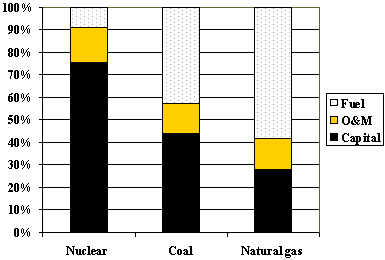Project Completion
It is a trap to think of the current status of a project is a basis for deciding on its completion. A plant that is 90% complete does not necessarily have only 10% of its costs unpaid. The remaining investment cost could be less and very frequently is much more, perhaps even more than the anticipated revenues from the completed plant. The revenue side of the NPV equation is also independent of the per cent completion of the NPP, except in the timing of revenue receipts, which is also key to decisions on future investment.
One curious note: Shutting down a construction project is potentially expensive, as most construction contracts have cancellation costs or penalties if a project is terminated. Completing the project at a loss may be cheaper than closing down the project. In these cases, it makes economic sense to complete the project.
Advertisement
Lifetime Extension
There are several major benefits to lifetime extensions over the building of new plants. One assumes that operating costs are already low or else extension would not be considered. The plant’s decommissioning fund obligations should also be fully satisfied, further reducing operating costs. Investment costs for lifetime extension, while not trivial, are likely to be only a fraction of the cost of a new plant. Life extension can also be attractive for environmental reasons in regions where compliance with air pollution standards or commitments to greenhouse gas emissions reductions argue against increased use of fossil-fuel fired generation. Such plants usually carry little debt, being largely amortized by the time of renewal, and already have a revenue stream attached to assure repayment of any financial obligations incurred for the relicensing or life extension. A lifetime or license extension can also result in the effective addition of new capacity.
Safety Upgrade
Safety upgrades may be required for a number of reasons and may or may not result in increased efficiency or may, in fact, carry efficiency penalties. Owners faced with safety upgrades could face investments they cannot expect to amortize over the extended life of the plant. Moreover, plants with insufficient cash flow simply cannot finance needed upgrades, no matter how closely these might be linked to safety concerns. If continued regulatory approval for the operation of the plant hinges on the upgrade, the cost of such investments needs to be weighed both against expected revenues and against the cost of closing the plant.
New Plants
New NPPs can cost 2–4 times more to build than fossil-fueled plants. Investment in a nuclear plant would require well over twenty years to repay. Competitive capital markets would require a higher return on investment to justify these longer-term risks.
Generating costs have fallen from US$0.043 per kWh in 1995 to US$0.03 per kWh by 1998. The average is now around US$0.02 and likely to fall further. This decline in generating costs did not just result from competition, but also from low fuel prices and from significant improvements in efficiency in the use of coal and gas. The thermal efficiency of gas use has risen to well over fifty percent with promises of further improvements. Low cost and high efficiency will therefore be essential characteristics of any plants to be built in the future, and non-nuclear technologies are developing rapidly in this direction.
Advertisement
Since investors in new generating plants have no sunk costs and are free to choose at the outset the fuel, technology, site, plant design, financing operations and risk allocation that suits them best, they will tend to opt for the highest-return, least-risk alternative. Unless the nuclear industry takes dramatic action to reduce capital costs and financial risks for new nuclear plants, nuclear power could well be priced out of the market, even where it offers other significant advantages.

Figure 2: Average electricity generation cost structure for nuclear, coal-fired and natural gas combined cycle plants, 10% discount rate and 25 year planning horizon. Source: Adapted from OECD, 1998.
This is an edited extract of a paper presented to the 23rd Annual IAEE International Conference: Energy Market and the New Millennium: Economic, Environment, Security of Supply, Hilton Sydney, Australia, 7-10 June 2000.
Discuss in our Forums
See what other readers are saying about this article!
Click here to read & post comments.
About the Authors
Hans-Holger Rogner works for the Department of Nuclear Energy, International Atomic Energy Agency, Vienna, Austria.
Lucille Langlois works for the Department of Nuclear Energy, International Atomic Energy Agency, Vienna, Austria.
John Cleveland works for the Department of Nuclear Energy, International Atomic Energy Agency, Vienna, Austria.